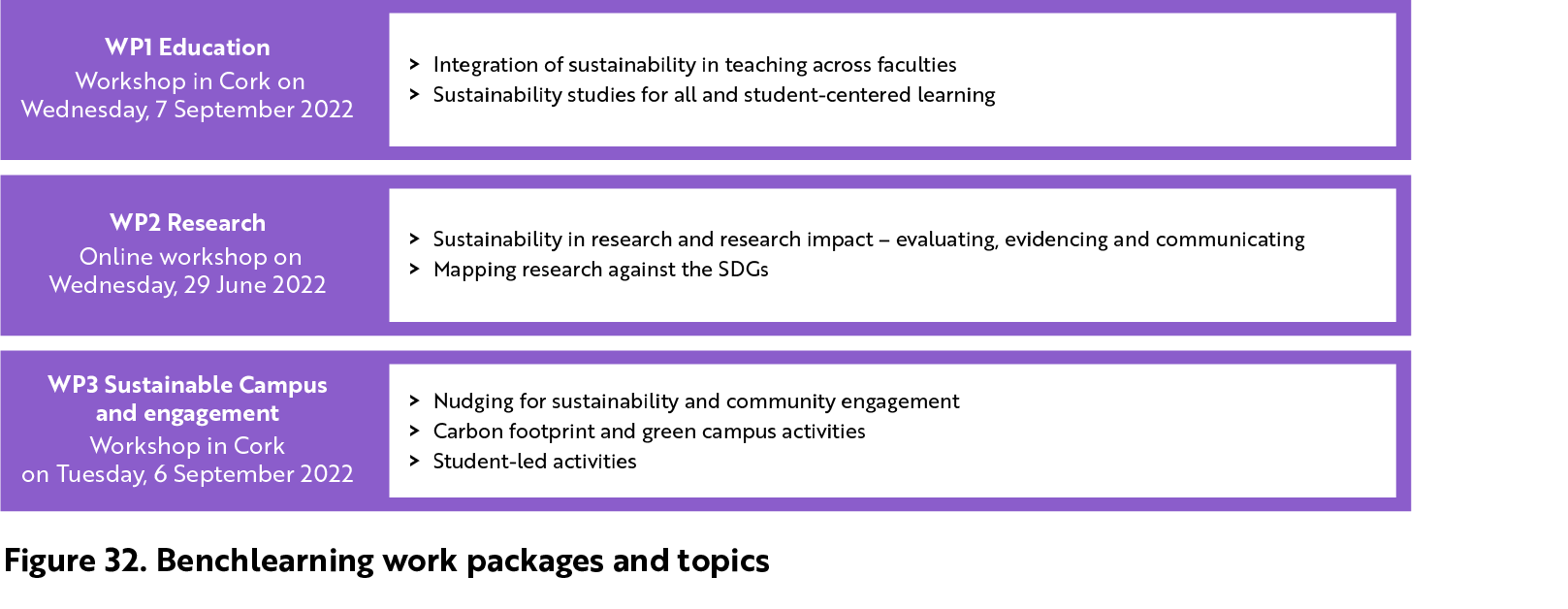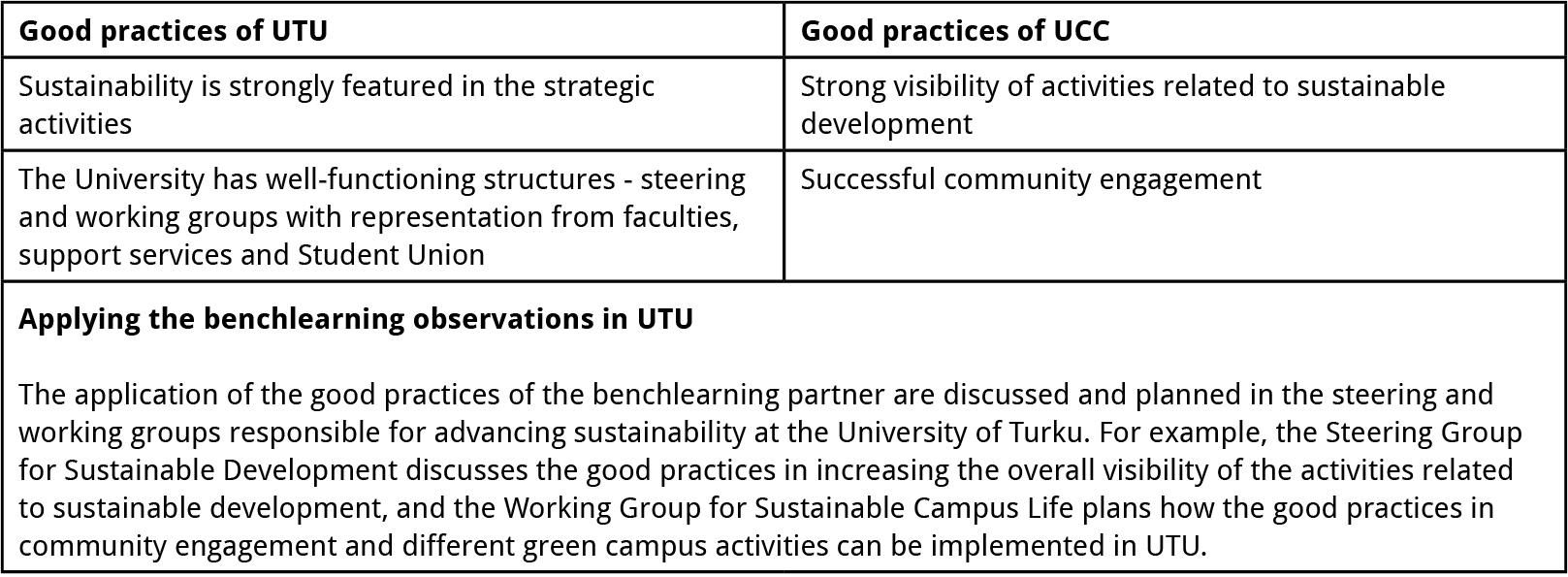The benchlearning target was selected through a participatory process coordinated by the Steering Group for Quality Work. UTU community were asked for proposals in autumn 2020 and the decision on the target was made in January 2021. The process for selecting sustainable development as the target for benchlearning is described in figure 29.

As a target, sustainable development is of strategic importance to the University. It is an underlying theme in the UTU Strategy and a cross-cutting topic embedded in all operations from research to education, and from societal interaction to campus development. UTU aims to further integrate sustainability in its activities and strengthen its role as a frontrunner in sustainable development. The importance of sustainable development at UTU shown in figure 30.

The key factors for a partner in the benchlearning were expertise and experience of the benchlearning theme and also the similarities between the partner institutions to ensure a mutually beneficial learning process. The University College Cork (UCC) in Ireland was chosen as a benchlearning partner as it has a long history of promoting sustainability and integrating sustainability in its activities. Furthermore, both universities are multidisciplinary and similar in terms of their size. The universities signed a Memorandum of Understanding for the benchlearning exercise in December 2021 and, along with the MoU, a project plan was drafted to set goals and support the implementation of the process.
The partners designed the benchlearning in co-operation in order to make it mutually useful and beneficial for both universities. The objective was to provide opportunities for both partners to get feedback on activities, to gain new insights related to the work around sustainability, and to learn from good practices.
The benchlearning process was coordinated by the Steering Group for Sustainable Development and the Steering Group for Quality Work ensuring that the exercise discussed relevant topics within the theme of sustainable development and that the process itself followed the FINEEC audit manual criteria. Both partners appointed main contacts for the practical coordination of the benchlearning exercise. At UTU, the Sustainable Development Specialist from the Partnerships and Strategic Engagement unit was in charge of the coordination of the process in close collaboration with the specialists from the quality team, Student Union representatives, and the Quality Manager of the University. Also, the three working groups set by the Steering Group for Sustainable Development (working groups for Sustainable Campus Life, Education of Sustainable Development, and Carbon Neutrality) were involved in the planning of the benchlearning exercise.
The benchlearning process consisted of three phases – planning, implementation and evaluation as described in figure 31.

In the early discussions between the partners, several topics for the benchlearning exercise were identified and the benchlearning was built around three different work packages. These were planned to support the ongoing sustainability-related activities and to get valuable insights for further development. Each work package involved student representation and relevant experts from both organisations. The three work packages and topics are shown in figure 32.

Engaging in a benchlearning with a partner like UCC was a rewarding and useful experience. All the work packages designed for the process were successfully implemented, and dialogue, feedback and ideas were exchanged. In addition to the learning achieved through the work packages, the exercise included a visit to Cork with the aim of deepening the benchlearning by exploring in person and on-site how UCC embeds sustainable development in their teaching, research, operations, and everyday campus life. The visit included field visits and dialogues between experts, and introduced a whole new dimension to the learning outcomes. Also, two out of three planned workshops were organised during the visit. The UTU representatives represented various different perspectives, which resulted in wider benchlearning observations. The representatives and their roles are described in figure 33.

As a general reflection from the benchlearning, both universities face similar challenges in integrating sustainable development in their activities and operations. Raising awareness and engaging the community were among the main challenges. Similar approaches and similar activities are taking place in both universities in order to integrate sustainability in university operations. The benchlearning process highlighted the need to focus on making the sustainability work more visible for the whole community and also to find ways to enable the community to participate more in the various sustainability activities at the universities.
As a good practice from UTU, sustainability is very well embedded in the Strategy as it sets goals for the University to advance sustainability. UTU also has good structures, a steering group, and working groups including representation from all faculties, support services, and Student Union. A good practice from UCC is the strong ‘student-led, research-informed and practice-focused’ approach in their work. UCC has also succeeded well in making visible their work on sustainability and offers both students and staff opportunities to take part in the activities.
The outcomes, ideas and initiatives stemming from the exercise will be further discussed and analysed in the Steering Group for Sustainable Development and in the working groups that operate under it, most importantly the Working Group for Sustainable Campus Life and the Working Group for Education of Sustainable Development. University of Turku Partnered with the University College Cork in a Benchlearning Exercise on Sustainable Development | University of Turku (utu.fi)

Audit team’s feedback
The University of Turku has a strategic ambition to incorporate sustainable development into the University’s structures and processes. Sustainability is already being considered in UTU’s curricula development. In addition, UTU’s Sustainability Development Services promote integration of sustainability into UTU’s core functions and services. The audit team sees that the setting this topic as the benchlearning target was justified and well-aligned with the University’s strategy.
The selection process of the benchlearning partner, University College Cork, was based on an existing partnership. As the decision was taken in the UTU’s bodies and, therefore, with the involvement of all stakeholders, the only suggestion regarding this process is to discuss the selection of benchlearning partners more extensively. Thereby, more inspiration could be gathered by taking a first look at different institutions and setting specific goals in the broad field of sustainable development could be possible. The audit team recommends that the University of Turku consider widening benchlearning in the sense of including more partners in the future, especially considering that many European universities have set sustainable development as one of their primary goals. These partners could be experts in multidisciplinarity pertaining to sustainability.
The on-site visits in Cork and discussions about the benchlearning project were open to members of relevant committees who benefitted from the exchange. As the visits in Cork were conducted only some months before the FINEEC audit process and visit, various working groups at UTU were still analysing the experiences and developing recommendations.
The main aspects regarding sustainable development that stood out in the University College Cork were its interaction with society, its systematic approach, and the vital role of the students. The audit team recommends that the University of Turku continue applying the lessons learned from the benchlearning project.